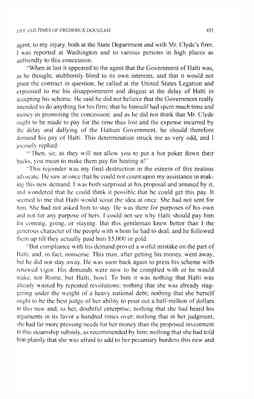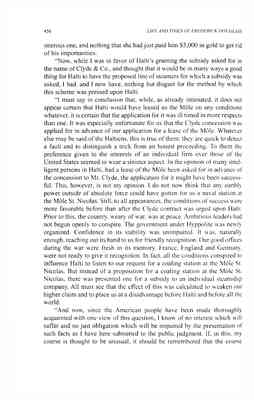Pages
81
LIFE AND TIMES OF FREDERICK DOUGLASS 455
agent, to my injury, both at the State Department and with Mr. Clyde's firm. I was reported at Washington and to various persons in high places as unfriendly to this concession.
"When at last it appeared to the agent that the Government of Haïti was, as he thought, stubbornly blind to its own interests, and that it would not grant the contract in question, he called at the United States Legation and expressed to me his disappointment and disgust at the delay of Haïti in accepting his scheme. He said he did not believe that the Government really intended to do anything for his firm; that he himself had spent much time and money in promoting the concession; and as he did not think that Mr. Clyde ought to be made to pay for the time thus lost and the expense incurred by the delay and dallying of the Haïtien Government, he should therefore demand his pay of Haïti. This determination struck me as very odd, and I jocosely replied:
"'Then, sir, as they will not allow you to put a hot poker down their backs, you mean to make them pay for heating it!'
"This rejoinder was my final destruction in the esteem of this zealous adrncate. He saw at once that he could not count upon my assistance in making this new demand. I was both surprised at his proposal and amused by it, and wondered that he could think it possible that he could get this pay. It seemed to me that Haïti would scout the idea at once. She had not sent for him. She had not asked him to stay. He was there for purposes of his own and not for any purpose of hers. I could not see why Haïti should pay him for coming, going, or staying. But this gentleman knew better than I the generous character of the people with whom he had to deal, and he followed them up till they actually paid him $5,000 in gold.
"But compliance with his demand proved a woeful mistake on the part of Haïti, and, in fact, nonsense. This man, after getting his money, went away, but he did not stay away. He was soon back again to press his scheme with renewed vigor. His demands were now to be complied with or he would make, not Rome, but Haïti, howl. To him it was nothing that Haïti was already wasted by repeated revolutions; nothing that she was already staggering under the weight of a heavy national debt; nothing that she herself ought to be the best judge of her ability to pour out a half-million of dollars in this new and, to her, doubtful enterprise; nothing that she had heard his arguments in its favor a hundred times over; nothing that in her judgment, she had far more pressing needs for her money than the proposed investment in this steamship subsidy, as recommended by him; nothing that she had told him plainly that she was afraid to add to her pecuniary burdens this new and
82
456 LIFE AND TIMES OF FREDERICK DOUGLASS
onerous one, and nothing that she had just paid him $5,000 in gold to get rid of his importunities.
"Now, while I was in favor of Haïti's granting the subsidy asked for in the name of Clyde & Co., and thought that it would be in many ways a good thing for Haïti to have the proposed line of steamers for which a subsidy was asked, I had, and I now have, nothing but disgust for the method by which this scheme was pressed upon Haïti.
"I must say in conclusion that, while, as already intimated, it does not appear certain that Haïti would have leased us the Môle on any conditions whatever, it is certain that the application for it was ill timed in more respects than one. It was especially unfortunate for us that the Clyde concession was applied for in advance of our application for a lease of the Môle. Whatever else may be said of the Haïtiens, this is true of them; they are quick to detect a fault and to distinguish a trick from an honest proceeding. To them the preference given to the interests of an individual firm over those of the United States seemed to wear a sinister aspect. In the opinion of many intelligent persons in Haïti, had a lease of the Môle been asked for in advance of the concession to Mr. Clyde, the application for it might have been successful. This, however, is not my opinion. I do not now think that any earthly power outside of absolute force could have gotten for us a naval station at the Môle St. Nicolas. Still, to all appearances, the conditions of success were more favorable before than after the Clyde contract was urged upon Haïti. Prior to this, the country, weary of war, was at peace. Ambitious leaders had not begun openly to conspire. The government under Hyppolite was newly organized. Confidence in its stability was unimpaired. It was, naturally enough, reaching out its hand to us for friendly recognition. Our good offices during the war were fresh in its memory. France, England and Germany, were not ready to give it recognition. In fact, all the conditions conspired to influence Haïti to listen to our request for a coaling station at the Môle St. Nicolas. But instead of a proposition for a coaling station at the Môle St. Nicolas, there was presented one for a subsidy to an individual steamship company. All must see that the effect of this was calculated to weaken our higher claim and to place us at a disadvantage before Haïti and before all the world.
"And now, since the American people have been made thoroughly acquainted with one view of this question, I know of no interest which will suffer and no just obligation which will be impaired by the presentation of such facts as I have here submitted to the public judgment. If, in this, my course is thought to be unusual, it should be remembered that the course

